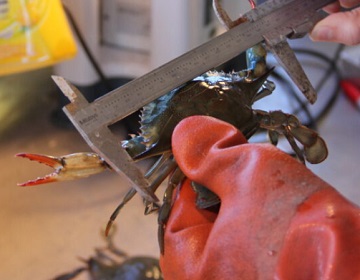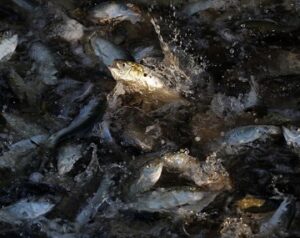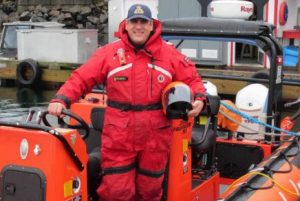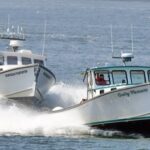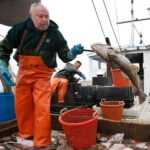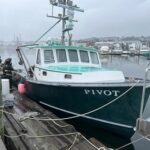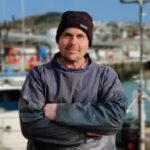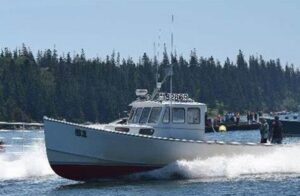The controversial menhaden fleet that supplies Omega Proteins’ Reedville plant is promising to limit areas in Chesapeake Bay where it will set its nets and catches fish. In a memorandum of understanding with the state, Ocean Harvesters said it wants to limit potential areas of conflict with other users of the Bay. Conservationists and recreational fishermen had pushed for limits, with some calling for an outright ban on catching menhaden in the Bay, after two spills of dead menhaden last year washed ashore. >click to read< 08:01
Tag Archives: Virginia Marine Resources Commission
Virginia Moves To End 16-Year Ban On Dredging For Crabs During Winter
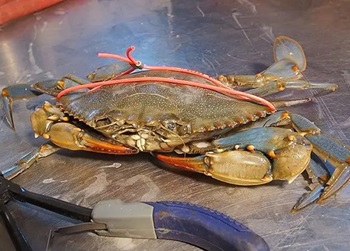 Virginia’s fishery managers have lifted the longstanding ban on dredging for blue crabs during the winter in the Chesapeake Bay, a seismic policy shift that drew strong criticism from their Maryland counterparts and conservationists. The Virginia Marine Resources Commission voted 5–4 on June 25 to repeal the 16-year prohibition on winter dredging. The board is expected to reconvene in September to consider staff recommendations on how to implement the fishery. The new season could open as early as this December. The board’s action came after the VMRC’s Crab Management Advisory Committee, which is mostly made up of industry members, voted 10–2 in favor of reopening the winter season. After that May 29 vote, the agency received 186 public comments on the proposal — all in opposition. more, >>CLICK TO READ<< 16:12
Virginia’s fishery managers have lifted the longstanding ban on dredging for blue crabs during the winter in the Chesapeake Bay, a seismic policy shift that drew strong criticism from their Maryland counterparts and conservationists. The Virginia Marine Resources Commission voted 5–4 on June 25 to repeal the 16-year prohibition on winter dredging. The board is expected to reconvene in September to consider staff recommendations on how to implement the fishery. The new season could open as early as this December. The board’s action came after the VMRC’s Crab Management Advisory Committee, which is mostly made up of industry members, voted 10–2 in favor of reopening the winter season. After that May 29 vote, the agency received 186 public comments on the proposal — all in opposition. more, >>CLICK TO READ<< 16:12
Why retired officer says Marine Police guarding the Chesapeake Bay are being ‘wasteful’
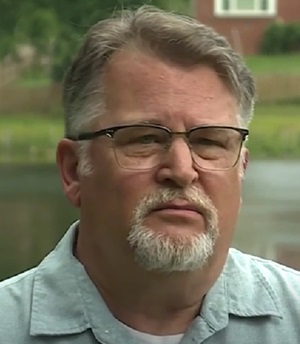 Andrew Cortez cares deeply about the Chesapeake Bay. “The Chesapeake Bay is our natural heritage,” Cortez said. “A healthy bay helps everyone.” The retired law enforcement officer was an investigator for 36 years, working to keep the Chesapeake in check with different agencies as a special agent with U.S. Fish and Wildlife. He now has concerns about the group meant to do just that: the Virginia Marine Resources Commission, which oversees Virginia Marine Police. “One of the things that really struck me is the amount of money they’re spending on what I would consider to be toys, unnecessary squandering of public money,” Cortez said. Photos, video, more, >>CLICK TO READ<< 07:38
Andrew Cortez cares deeply about the Chesapeake Bay. “The Chesapeake Bay is our natural heritage,” Cortez said. “A healthy bay helps everyone.” The retired law enforcement officer was an investigator for 36 years, working to keep the Chesapeake in check with different agencies as a special agent with U.S. Fish and Wildlife. He now has concerns about the group meant to do just that: the Virginia Marine Resources Commission, which oversees Virginia Marine Police. “One of the things that really struck me is the amount of money they’re spending on what I would consider to be toys, unnecessary squandering of public money,” Cortez said. Photos, video, more, >>CLICK TO READ<< 07:38
Virginia’s blue crab commercial harvest period extended
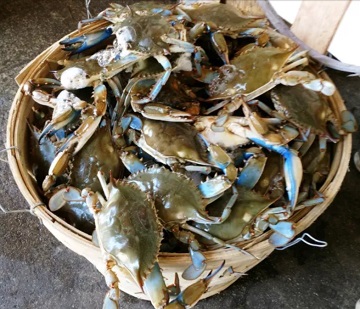 The Virginia Marine Resources Commission voted last week to approve the extension recommended by the Crab Management Advisory Committee. The harvest of crabs by hard crab pot is now Dec. 16, pushed back from Nov. 30. Lower bushel limits will begin Nov. 1 instead of Oct. 1. The purpose of these changes is to promote efficient utilization of blue crabs and economic stability for the fishing industry, according to the Marine Resources Commission. “Female crabs are not overfished, and overfishing is not occurring on them,” said Alexa Galván, a fisheries manager with the commission during a VRMC meeting. “But, the 2021 and 2022 exploitation rates were slightly above the target, not of the threshold which would be overfishing.” >>click to read<< 12:50
The Virginia Marine Resources Commission voted last week to approve the extension recommended by the Crab Management Advisory Committee. The harvest of crabs by hard crab pot is now Dec. 16, pushed back from Nov. 30. Lower bushel limits will begin Nov. 1 instead of Oct. 1. The purpose of these changes is to promote efficient utilization of blue crabs and economic stability for the fishing industry, according to the Marine Resources Commission. “Female crabs are not overfished, and overfishing is not occurring on them,” said Alexa Galván, a fisheries manager with the commission during a VRMC meeting. “But, the 2021 and 2022 exploitation rates were slightly above the target, not of the threshold which would be overfishing.” >>click to read<< 12:50
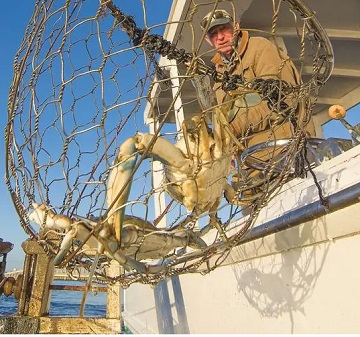
Reins Loosened Slightly On Chesapeake Bay Crab Harvest
“We’re being cautious, but I think we’re being responsible,” said Ed Tankard, a board member with the Virginia Marine Resources Commission, which voted June 27 to ease certain bushel limits. In Maryland, the state Department of Natural Resources announced on the same day a raft of industry-friendly changes to its crab controls, including modestly increasing the allowable harvest of female crabs and lifting limits on the harvest of males over Labor Day weekend. Those moves came a few weeks after the panel that regulates the Potomac River’s fishing industry agreed to roll back bushel limits on female crabs to 2021 levels. >click to read< 12:21
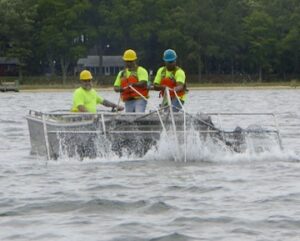
Omega Protein and Fishing Partner Ocean Harvesters Successfully Test Fish Spill Response Vessel
Ocean Harvesters, the exclusive fishing partner of Omega Protein, is continuing its commitment to responsible stewardship of the Chesapeake Bay with the deployment of a new response team and recovery vessel to more effectively respond to rare incidents like net tears and fish spills. As part of this effort, Ocean Harvesters, in cooperation with the Virginia Marine Resources Commission (VMRC), has successfully tested a skimmer vessel, which will arrive at the scene of a net tear and work to recover spilled fish from the surface that threaten shorelines. This vessel will begin operating in the Bay with this upcoming fishing season. photos, video, >click to read< 09:57
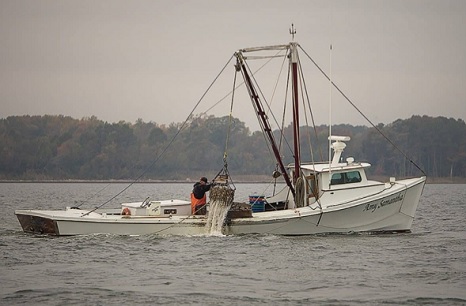
Extended Va. Oyster Season Poised for Largest Harvest In 35 Years
With Virginia watermen enjoying their most bountiful wild harvest in 35 years, state fisheries managers have agreed to extend the season by two weeks. The Virginia Marine Resources Commission (VMRC) voted unanimously to allow wild oyster harvests for an extra 10 working days in areas where commission staff judged the bivalve populations abundant enough to withstand additional fishing pressure. “We’ve had a great oyster season, and it’s still going strong,” said J.C. Hudgins, head of the Virginia Waterman’s Association. “It’s been good everywhere we go.” Looking back, it’s quite a turnaround. >click to read< 07:36
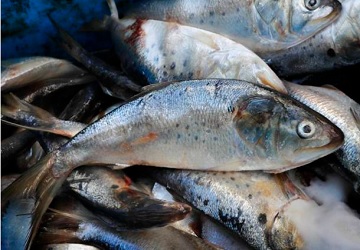
Virginia Regulators to Consider Changes to Menhaden Fishing Regulations
Virginia regulators will consider changes to commercial menhaden fishing in the Chesapeake Bay following requests from recreational anglers to put an end to the fishery. The proposals follow repeated requests from the Virginia Saltwater Sportfishing Association to stop menhaden fishing in the Bay, including a petition of 11,000 signatures that was presented to the office of Republican Gov. Glenn Youngkin earlier this year. Reedville-based Omega Protein, the lone player in the Bay’s menhaden reduction fishery, which processes catches into fishmeal or fish oil, says the new regulations take away available fishing grounds that include uninhabited areas. Taking operations completely out of the Bay into less safe conditions in the ocean would ultimately force the company to stop operating. >click to read< 11:51
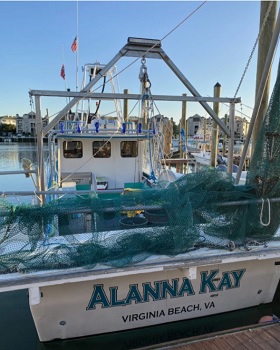
Seeing experimental success, Virginia Beach shrimp season is extended
The experimental shrimp season, scheduled to end on New Year’s Eve, has been extended to Jan. 31 for Virginia Beach-based watermen. The state’s shrimp experiment started in 2017 after watermen started to notice an increase in the number of shrimp getting snagged in their fishing nets. One waterman was granted a permit. Today, eight watermen in Virginia Beach and two on the Eastern Shore have permits that are handed out in a lottery system. This transition will include more watermen and possibly a longer season and a wider area in which to search for shrimp. video, >click to read< 14:41
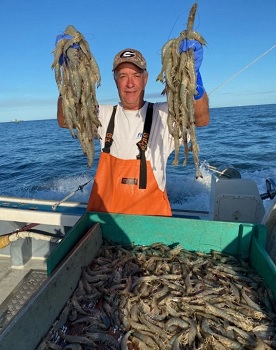
There’s something in the water: Shrimp!
Back in the 1990s, watermen started noticing shrimp were getting caught in their gill nets in waters just off Virginia Beach. Virginia Marine Resources Commission in 2018 issued free shrimp permits to a couple of watermen in Virginia Beach who would haul in 300 pounds of shrimp on a good day. Today, 12 watermen, with permits, work the waters for shrimp and on a good day, the haul is more than a thousand pounds. 100 people applied for 2020 permits but only 12 permits were issued to watermen in Virginia Beach and the Eastern Shore in a lottery system. Shrimping is also a game of chance. “One day I think I caught 16 shrimp, two days later [I caught] 1700 pounds,” >video, click to read< 07:34
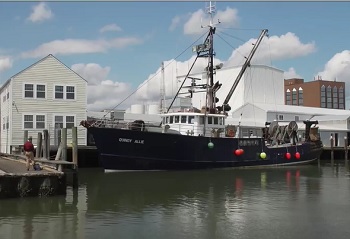
‘I Don’t Know if We Will Make It’: Fishing Industry Takes a Huge Hit from Coronavirus
Commercial fishing is one of the many industries suffering from the impact of the COVID-19 pandemic. It’s led to a dramatically shrinking market for seafood as restaurants either close or have converted to takeout, and consumers stay home. It’s a quiet scene these days at L.D. Amory & Co. in Hampton, Va. The normally bustling wholesale seafood packer is struggling. “About 80 percent of the product we pack here ends up in restaurants,” Meade Amory, vice president of the company, told CBN News. “And so far we have no markets for our products right now, and it’s been very difficult.” Video, >click to read< 10:34
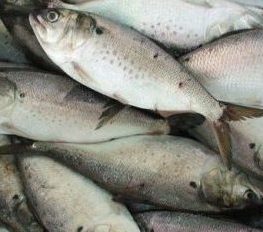
Menhaden regulations have plagued lawmakers for decades.
Every year, the drama has followed the same lines. Some lawmakers and environmentalists concerned about the health of the valuable fishery, the only one managed by the legislature rather than regulators, push to transfer its management to the Virginia Marine Resources Commission. The industry and its unionized fishermen, concerned that regulators will cramp their business, push back. It’s been perhaps the state’s dullest political tug-of-war. But then, this winter, it ended when Omega Protein, the Reedville-based Canadian company that is the largest single player in the U.S. menhaden industry, told a Senate panel that it supported legislation to hand over fishery management to the VMRC. >click to read< 07:39
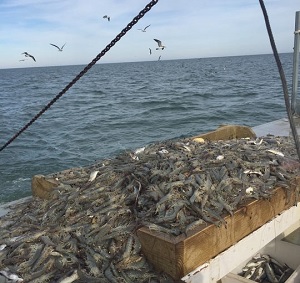
Shrimping has begun off the Eastern Shore of Virginia.
White shrimp, which thrive in the Gulf of Mexico and south Atlantic Ocean, typically only venture as far north as North Carolina in any significant numbers. A ghost of a shrimp market has existed off Virginia for only one or two weeks out of the year, but this year, it’s something different. This fall, six watermen have been granted licenses to trawl for much larger quantities of the succulent 4-8 inch shrimp in an experimental fishery,, >click to read< 08:18
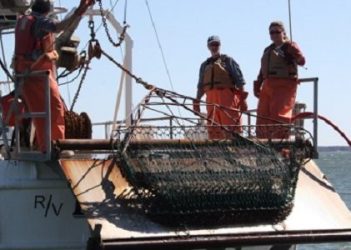
Blue crab stock healthy with above average abundance
Results from the latest Blue Crab Winter Dredge Survey — conducted annually by the Virginia Institute of Marine Science and Maryland Department of Natural Resources — show the Chesapeake Bay’s blue crab stock remains healthy and able to support quality commercial and recreational harvests. The results — available due to months of field sampling and laboratory analysis by VIMS researchers Mike Seebo, Katie Knick, Gabby Saluta, Alison Smith, and colleagues at Maryland DNR — were announced by the Virginia Marine Resources Commission and Maryland DNR leadership. >click to read<21:22
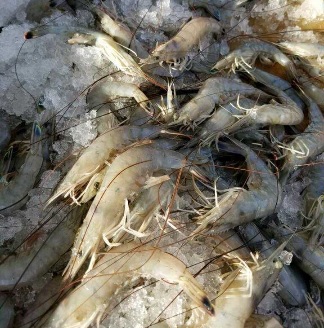
Local fishermen approved to trawl commercially off coast of Virginia Beach
If you head to a restaurant in Virginia Beach, you might just find freshly caught Virginia shrimp on the menu. That’s thanks to an experimental fishing permit given to two local fishermen. Deputy Chief of Fisheries Management for the Virginia Marine Resources Commission Patrick Geer said in recent years, they have seen waters along the East Coast starting to warm. That, in combination with a few other factors, has caused an increase in larvae to settle in our area, meaning more shrimp are surviving in our waters. >click to read<10:10
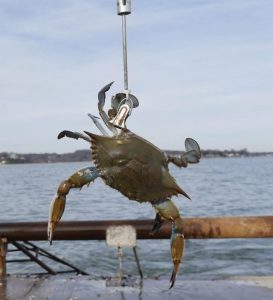
Blue crab population declines by almost 18%
The annual Blue Crab Advisory Report by the Chesapeake Bay Program and developed by the Chesapeake Bay Stock Assessment Committee, finds that the overall Chesapeake Bay blue crab population decreased by almost 18 percent from 455 million in 2017 to 372 million in 2018. The report, released last month, provides scientific analysis of the Bay’s blue crab population to help resource managers as they set blue crab fishing regulations.,, According to the report and the scientific reference points that resource managers follow for “target” (healthy) and “threshold” (border between safe and unsafe) levels, the Bay’s blue crab population is currently not depleted, nor is it being overfished. >click to read<20:12

A Political Fish Tale That Could Bait Trump
A fish story isn’t one without a bit of exaggeration. Consider menhaden: A bony, little fish used for bait and to make fertilizer, animal feed, dietary supplements and lipstick, it is vital to marine ecology as a bottom-of-the-food-chain staple for other creatures, finned and winged, and as an oceanic janitor, scrubbing waters clean of algae. And menhaden is the protagonist in an economic and political tale that could lead to a confrontation between President Trump and the state that denied him a sweep of the South in 2016: Virginia.,,, And this fish story includes a little-noticed and rare breach between Gov. Ralph Northam and his predecessor, fellow Democrat Terry McAuliffe,,, Racing to the exits, McAuliffe, whose political action committee received $15,000 from Omega in 2017, initiated an appeal to the Atlantic States Marine Fisheries Commission to forgo the new restriction. >click to read<12:24
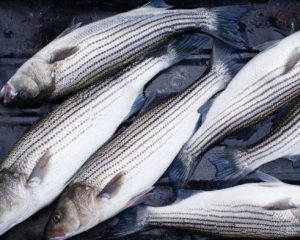
Proposal for tighter oversight of recreational striped bass catch dies
Commercial fishermen asked state regulators Tuesday night to make recreational fishermen tag their striped bass the way commercial operators do, to make sure they’re not taking too many fish. But the idea died when Doug Jenkins, president of the Twin Rivers Watermen’s group, in Warsaw, outlined his proposal to the Virginia Marine Resources Commission’s finfish management advisory committee. “We’re losing our rockfish (striped bass) quota and losing our crab industry,” Jenkins told the committee. >click to read< 18:32

Virginia: Heavily lobbied menhaden bill finally emerges
After weeks of intensive, behind-closed-doors lobbying, the Chesapeake Bay’s oily, inedible menhaden fish finally landed on the General Assembly’s plate. After more than 90 minutes of debate, the House Agriculture, Chesapeake and Natural Resources Committee decided by an 11-10 vote that the best answer was: sort of. Earlier in the session, it let die a measure that would enact the Atlantic States Marine Fisheries Commission’s purse seine quota cut, to 51,000 metric tons, into state law. On Wednesday, it approved a measure, introduced by special permission a month after the usual deadline, that would strike the current quota of 87,216 tons from state law and empower the head of the Virginia Marine Resources Commission to set a new purse seine quota of not less than 51,000 tons once the state had made its case to the commission that the quota cut was too steep. >click to read< 15:14
Officer honored after April rescue effort off Tangier Island
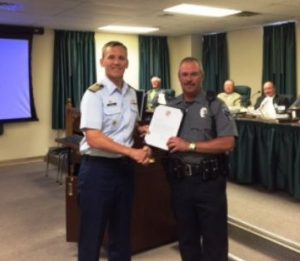 The U.S. Coast Guard has honored a Virginia Marine Police officer for his “vital assistance” in the investigation of the sinking of a commercial fishing vessel in April which resulted in the death of a Tangier Island waterman and the rescue of his son. Coast Guard Capt. Richard J. Wester, captain of the Port of Hampton Roads, presented Master Officer Richard W. Pruitt with the Coast Guard Sector Hampton Road’s “Command Coin” in a ceremony during the Virginia Marine Resources Commission monthly board meeting. On April 24 at about 2:30 p.m., a distress signal was sent out by the late commercial waterman Edward Charnock, 70, and his son, Jason Charnock, 39, that their boat, the Henrietta C, was sinking, Coast Guard officials said. click here to read the story 13:08
The U.S. Coast Guard has honored a Virginia Marine Police officer for his “vital assistance” in the investigation of the sinking of a commercial fishing vessel in April which resulted in the death of a Tangier Island waterman and the rescue of his son. Coast Guard Capt. Richard J. Wester, captain of the Port of Hampton Roads, presented Master Officer Richard W. Pruitt with the Coast Guard Sector Hampton Road’s “Command Coin” in a ceremony during the Virginia Marine Resources Commission monthly board meeting. On April 24 at about 2:30 p.m., a distress signal was sent out by the late commercial waterman Edward Charnock, 70, and his son, Jason Charnock, 39, that their boat, the Henrietta C, was sinking, Coast Guard officials said. click here to read the story 13:08
Virginia Marine Resources Commission revokes seven commercial fishing licenses at meeting
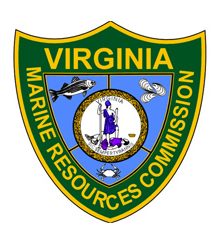 The Virginia Marine Resources Commission revoked the fishing licenses of seven commercial watermen at a meeting in Newport News on Tuesday, according to a release. VMRC spokeswoman Laurie Naismith said the licenses were revoked for “egregious or repeated violations of Virginia’s fishing laws and regulations.” Richard N. Fluharty of Tilghman, Md., was found to be illegally harvesting oysters and had his commercial license revoked for two years. Fluharty was convicted of four counts of failing to report harvests and three counts of forging public documents in Accomack County General District Court. His convictions led to his license revocation, the release stated. Robert N. Hogge’s commercial license was revoked for one year. Hogge, a Newport News resident, was convicted in Newport News Circuit Court of taking oysters from a public rock out of season, taking oysters with a hand scrape out of season and grand larceny. Anthony D. Hogge of Gloucester Point was convicted of multiple violations Read the rest here 14:40
The Virginia Marine Resources Commission revoked the fishing licenses of seven commercial watermen at a meeting in Newport News on Tuesday, according to a release. VMRC spokeswoman Laurie Naismith said the licenses were revoked for “egregious or repeated violations of Virginia’s fishing laws and regulations.” Richard N. Fluharty of Tilghman, Md., was found to be illegally harvesting oysters and had his commercial license revoked for two years. Fluharty was convicted of four counts of failing to report harvests and three counts of forging public documents in Accomack County General District Court. His convictions led to his license revocation, the release stated. Robert N. Hogge’s commercial license was revoked for one year. Hogge, a Newport News resident, was convicted in Newport News Circuit Court of taking oysters from a public rock out of season, taking oysters with a hand scrape out of season and grand larceny. Anthony D. Hogge of Gloucester Point was convicted of multiple violations Read the rest here 14:40
VMRC enforces maximum habitual offender poaching penalties
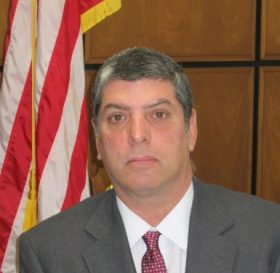 The Virginia Marine Resources Commission flexed new muscle last month when it stripped a Hampton waterman of his commercial fishing license for five years for poaching oysters and levied a $10,000 civil penalty. It marks the first time commissioners enforced maximum poaching penalties that took effect July 1, 2015. Until then, the maximum was a two-year loss of license with no civil penalty. The new law targets repeat offenders who commit egregious violations of state code, said VMRC Commissioner John Bull. And it can be applied only after convictions in criminal court. While Bull and fellow board members believe the new penalties better fit the crime, not everyone agrees. J.C. Hudgins, a Mathews County waterman and treasurer of the Virginia Watermen’s Association, “I think everybody feels like a habitual offender like that needs to have something done — needs to have some restrictions or some penalties put on him,” Hudgins said. “But, phew, that’s a rough one there. … Five years, that’s a long time.” Read the story here 09:55
The Virginia Marine Resources Commission flexed new muscle last month when it stripped a Hampton waterman of his commercial fishing license for five years for poaching oysters and levied a $10,000 civil penalty. It marks the first time commissioners enforced maximum poaching penalties that took effect July 1, 2015. Until then, the maximum was a two-year loss of license with no civil penalty. The new law targets repeat offenders who commit egregious violations of state code, said VMRC Commissioner John Bull. And it can be applied only after convictions in criminal court. While Bull and fellow board members believe the new penalties better fit the crime, not everyone agrees. J.C. Hudgins, a Mathews County waterman and treasurer of the Virginia Watermen’s Association, “I think everybody feels like a habitual offender like that needs to have something done — needs to have some restrictions or some penalties put on him,” Hudgins said. “But, phew, that’s a rough one there. … Five years, that’s a long time.” Read the story here 09:55
Virginia Marine Resources Commission hits fisherman with new maximum punishment
 Last year, state lawmakers answered a plea from Virginia’s commercial fishing industry to toughen the penalties for watermen who repeatedly break the law. On Tuesday, the Virginia Marine Resources Commission brought down that bigger hammer for the first time – yanking the licenses of a Hampton fisherman for five years and slapping him with a $10,000 civil penalty. It took the commission’s law enforcement staff 50 pages to document David A. Turner’s history of fisheries violations – nearly two dozen in state courts since 2001, including 10 this year. Among the latest were convictions for harvesting oysters from creeks that had been condemned because of pollution. An undercover sting by Virginia Marine Police led to those charges. “I haven’t seen anything this bad,” Marine Resources Commission chief John Bull told fellow commissioners after listening to a police officer’s rundown. It was a “laundry list … of some of the most serious oyster violations that I can imagine.” Read the story here 21:35
Last year, state lawmakers answered a plea from Virginia’s commercial fishing industry to toughen the penalties for watermen who repeatedly break the law. On Tuesday, the Virginia Marine Resources Commission brought down that bigger hammer for the first time – yanking the licenses of a Hampton fisherman for five years and slapping him with a $10,000 civil penalty. It took the commission’s law enforcement staff 50 pages to document David A. Turner’s history of fisheries violations – nearly two dozen in state courts since 2001, including 10 this year. Among the latest were convictions for harvesting oysters from creeks that had been condemned because of pollution. An undercover sting by Virginia Marine Police led to those charges. “I haven’t seen anything this bad,” Marine Resources Commission chief John Bull told fellow commissioners after listening to a police officer’s rundown. It was a “laundry list … of some of the most serious oyster violations that I can imagine.” Read the story here 21:35
Hampton Roads – 12 people lose fishing licenses following “serious violations”
Twelve people across Hampton Roads had their fishing license revoked for “serious violations” in January and February. The  Virginia Marine Resources Commission filed the violations at its January and February meetings, said spokeswoman Laurie Naismith. Violations include Convictions of giving a false statement/altering a fishing license, one count of failure to have an approved receptacle for sewage disposal on board an oyster harvesting vessel, failure to report mandatory harvest reports and three counts of forging a public document, and so on. Read the rest here 22:03
Virginia Marine Resources Commission filed the violations at its January and February meetings, said spokeswoman Laurie Naismith. Violations include Convictions of giving a false statement/altering a fishing license, one count of failure to have an approved receptacle for sewage disposal on board an oyster harvesting vessel, failure to report mandatory harvest reports and three counts of forging a public document, and so on. Read the rest here 22:03
Removal of derelict fishing gear has major economic impact
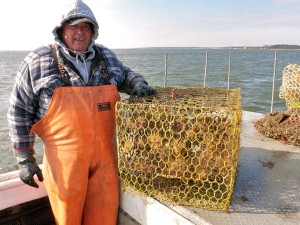 A new study by researchers at William & Mary’s Virginia Institute of Marine Science shows that removal of derelict fishing gear could generate millions of dollars in extra harvest value for commercial fisheries worldwide. The study focused on a 6-year, collaborative program to remove derelict crab pots from Chesapeake Bay, showing that the effort generated more than $20 million in harvest value for area watermen. Extending their methodology to estimate the economic benefits of removing derelict crab pots and lobster traps on a global basis,,, Read the article here 08:49
A new study by researchers at William & Mary’s Virginia Institute of Marine Science shows that removal of derelict fishing gear could generate millions of dollars in extra harvest value for commercial fisheries worldwide. The study focused on a 6-year, collaborative program to remove derelict crab pots from Chesapeake Bay, showing that the effort generated more than $20 million in harvest value for area watermen. Extending their methodology to estimate the economic benefits of removing derelict crab pots and lobster traps on a global basis,,, Read the article here 08:49
Omega Protein : Conservation groups and legislators look to change menhaden regulations
 With the lights of the Chesapeake Bay Bridge-Tunnel twinkling in the background, Barry Knight looked at a room full of supporters and realized he no longer was alone. For nearly a decade, the Republican member of the Virginia House of Delegates has been trying to wrestle the menhaden fishing industry from the grasp of the state’s General Assembly. An environmentally conscious angler and a rural Virginia Beach pig farmer, he has wondered for years why menhaden are the only species in Virginia waters that are not controlled by the Virginia Marine Resources Commission. Read the article here 15:31
With the lights of the Chesapeake Bay Bridge-Tunnel twinkling in the background, Barry Knight looked at a room full of supporters and realized he no longer was alone. For nearly a decade, the Republican member of the Virginia House of Delegates has been trying to wrestle the menhaden fishing industry from the grasp of the state’s General Assembly. An environmentally conscious angler and a rural Virginia Beach pig farmer, he has wondered for years why menhaden are the only species in Virginia waters that are not controlled by the Virginia Marine Resources Commission. Read the article here 15:31
Dead menhaden wash up on Eastern Shore after fish spill from Omega Protein boat
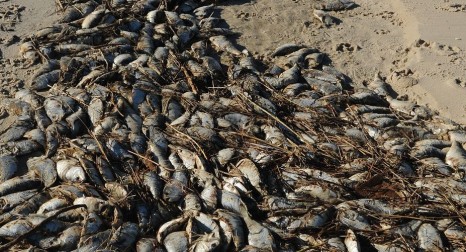 Last Wednesday, said Omega spokesman Ben Landry, the John Dempster was pulling in hundreds of thousands of menhaden from the bay when the net apparently ripped on some bottom debris and dumped about 75,000 dead fish into the water. It’s an unfortunate accident that occurs maybe two or three times a year, he said. Omega notified the Virginia Marine Resources Commission, he said. On Friday, he said, they got reports that the wave of dead menhaden would strike land, probably around Smith Beach and Cherrystone Inlet. Read the rest here 21:47
Last Wednesday, said Omega spokesman Ben Landry, the John Dempster was pulling in hundreds of thousands of menhaden from the bay when the net apparently ripped on some bottom debris and dumped about 75,000 dead fish into the water. It’s an unfortunate accident that occurs maybe two or three times a year, he said. Omega notified the Virginia Marine Resources Commission, he said. On Friday, he said, they got reports that the wave of dead menhaden would strike land, probably around Smith Beach and Cherrystone Inlet. Read the rest here 21:47
Jail time for Maryland Watermen pleading guilty of illegally obtaining Virginia oyster licenses
 Edward “Bruce” Lowery and Richard N. Fluharty, both of Tilghman Island, pleaded guilty last month in Accomack General District Court to three counts each of giving false information to a police officer and four counts each of failing to report their catch, according to the Virginia Marine Resources Commission. Each was fined $200 and sentenced to six months and 10 days in jail, with all but 10 days suspended. The two were charged with forging a public record in claiming Virginia residence on their applications for licenses to harvest oysters in the state. Read the rest here 16:39
Edward “Bruce” Lowery and Richard N. Fluharty, both of Tilghman Island, pleaded guilty last month in Accomack General District Court to three counts each of giving false information to a police officer and four counts each of failing to report their catch, according to the Virginia Marine Resources Commission. Each was fined $200 and sentenced to six months and 10 days in jail, with all but 10 days suspended. The two were charged with forging a public record in claiming Virginia residence on their applications for licenses to harvest oysters in the state. Read the rest here 16:39
UPDATED: Virginia Marine Resources Commission revokes licenses of 5 watermen for violations
 David S. Luckett Jr. of Hayes, Willie F. Shiflette Jr. of Hayes, Ava Marie Shiflette of Hayes and Charles Franklin Davenport of Hampton lost their licenses for two years, along with fishing privileges in Virginia’s tidal waters. The commission revoked the license and fishing privileges of Roger Lee Belvin of Achilles for one year. Davenport was convicted of several violations, including harvesting oysters from a condemned area. Read the rest here 12:49
David S. Luckett Jr. of Hayes, Willie F. Shiflette Jr. of Hayes, Ava Marie Shiflette of Hayes and Charles Franklin Davenport of Hampton lost their licenses for two years, along with fishing privileges in Virginia’s tidal waters. The commission revoked the license and fishing privileges of Roger Lee Belvin of Achilles for one year. Davenport was convicted of several violations, including harvesting oysters from a condemned area. Read the rest here 12:49






